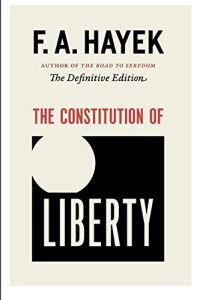Join getAbstract to access the summary!

Join getAbstract to access the summary!
Friedrich A. Hayek
The Constitution of Liberty
University of Chicago Press, 2011
What's inside?
Friedrich A. Hayek’s 1960 treatise on liberty and limited government returns to enlighten a new generation.
Recommendation
The timeless insights economist and political philosopher Friedrich A. Hayek wrote in 1960 still have currency. His reasoned advocacy of economic freedom and personal liberty applies to many modern debates. Hayek contrasts limited government's benefits with the costs of central economic planning. He shows how liberty takes sustenance from law, due process and constitutional government, and notes serious but subtle threats to individual freedom. Scholars turn to Hayek – and his work among the classics of modern economic thought – for a detailed philosophical foundation for limited government.
Summary
About the Author
Friedrich A. Hayek, an Austrian-born economist and political philosopher, advocated market-based capitalism and limited government. He was co-winner of the Nobel Prize for Economics in 1974 and recipient of the Presidential Medal of Freedom in 1991.



















Comment on this summary